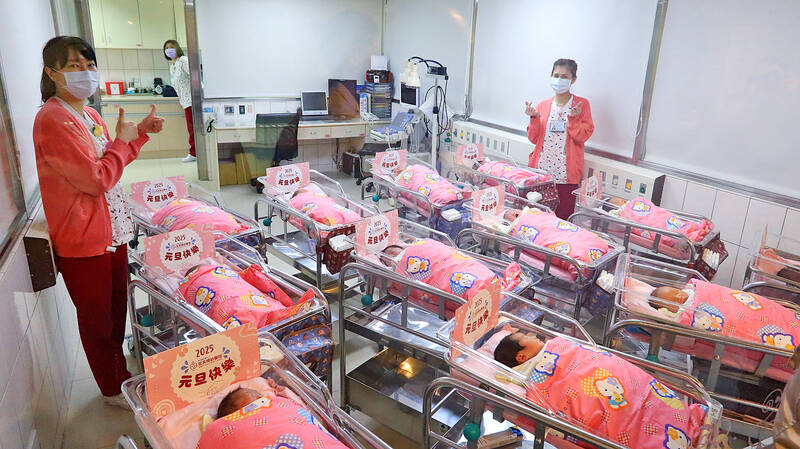Taiwan’s birthrate likely continued to decline last year despite it being the Year of the Dragon, which is believed by some people to bring good fortune and greatness.
There are typically more babies born during a Year of the Dragon in Taiwan.
Birthrates in the past three dragon years have been higher than the surrounding years.

Photo: Huang Cheng-chia, Taipei Times
In the previous Year of the Dragon, 2012, there were 229,400 births, a 16.7 percent increase from the previous year.
In 2013, the number of births dropped below 200,000, showing that the Year of the Dragon produced a spike in the birthrate.
As of November last year, there were 122,360 births, Ministry of the Interior data showed.
To surpass 2023’s birthrate, at least 13,211 babies would need to have been born last month, which was unlikely.
This means that the birthrate likely declined for the ninth consecutive year.
Cathay General Hospital reported only three New Year’s babies born yesterday, with seven women still in labor.
Lee Women’s Hospital in Taichung reported only two New Year’s babies.
As people get married and have children later than they used to, a declining birthrate is inevitable, Taiwan Association of Obstetrics and Gynecology chairman Huang Chien-pei (黃建霈) said.
In the past, Taiwanese typically got married in their 20s and had more than 20 years to have children, Huang said.
Now people typically get married in their 30s, with an increasing number getting married later or not at all, he said.
People getting married later and having less time than before to have children have led to a decrease in pregnancy rate, he added.
The declining birthrate has also negatively affected the talent shortage in the pediatric, obstetrics and gynecology specialties, Huang said.
The enrollment rate has dropped by 30 to 40 percent for pediatrics, and by about 10 percent for obstetrics and gynecology, he said.
The number of doctors focusing on obstetrics is decreasing annually, he added.
To face the declining birthrate, mothers must receive comprehensive care during prenatal checkups, delivery and postpartum, Huang said.
Prenatal care in Taiwan focuses on physical health, while mental health and postpartum care are underdeveloped, he said.
Stress during pregnancy and postpartum can significantly impact the health of the baby and mother, he added.
The government should invest in resources to provide more comprehensive support to pregnant women and mothers, Huang said.
If fathers learn how to better support their partners, it would also help improve overall family health, he said.
Comprehensive support measures, including mental and physical healthcare, and economic assistance policies, can positively impact the birthrate, he said.

WANG RELEASED: A police investigation showed that an organized crime group allegedly taught their clients how to pretend to be sick during medical exams Actor Darren Wang (王大陸) and 11 others were released on bail yesterday, after being questioned for allegedly dodging compulsory military service or forging documents to help others avoid serving. Wang, 33, was catapulted into stardom for his role in the coming-of-age film Our Times (我的少女時代). Lately, he has been focusing on developing his entertainment career in China. The New Taipei District Prosecutors’ Office last month began investigating an organized crime group that is allegedly helping men dodge compulsory military service using falsified documents. Police in New Taipei City Yonghe Precinct at the end of last month arrested the main suspect,

A cat named Mikan (蜜柑) has brought in revenue of more than NT$10 million (US$305,390) for the Kaohsiung MRT last year. Mikan, born on April 4, 2020, was a stray cat before being adopted by personnel of Kaohsiung MRT’s Ciaotou Sugar Refinery Station. Mikan was named after a Japanese term for mandarin orange due to his color and because he looks like an orange when curled up. He was named “station master” of Ciaotou Sugar Refinery Station in September 2020, and has since become famous. With Kaohsiung MRT’s branding, along with the release of a set of cultural and creative products, station master Mikan

RISING TOURISM: A survey showed that tourist visits increased by 35 percent last year, while newly created attractions contributed almost half of the growth Changhua County’s Lukang Old Street (鹿港老街) and its surrounding historical area clinched first place among Taiwan’s most successful tourist attractions last year, while no location in eastern Taiwan achieved a spot in the top 20 list, the Tourism Administration said. The listing was created by the Tourism Administration’s Forward-looking Tourism Policy Research office. Last year, the Lukang Old Street and its surrounding area had 17.3 million visitors, more than the 16 million visitors for the Wenhua Road Night Market (文化路夜市) in Chiayi City and 14.5 million visitors at Tainan’s Anping (安平) historical area, it said. The Taipei 101 skyscraper and its environs —

Taiwan on Friday said a New Zealand hamburger restaurant has apologized for a racist remark to a Taiwanese customer after reports that it had first apologized to China sparked outrage in Taiwan. An image posted on Threads by a Taiwanese who ate at Fergburger in Queenstown showed that their receipt dated Sunday last week included the words “Ching Chang,” a racial slur. The Chinese Consulate-General in Christchurch in a statement on Thursday said it had received and accepted an apology from the restaurant over the incident. The comment triggered an online furor among Taiwanese who saw it as an insult to the